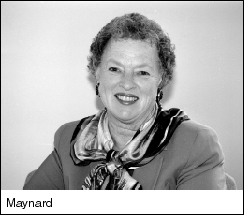The University Record, October 7, 1998
Olivia Maynard committed to diversity of University
By Rebecca A. Doyle
 Olivia P. Maynard-Libby to her friends and colleagues-is as comfortable on the back of one of her horses as she is in an oversize chair in the Regents Room in the Fleming Building.
Olivia P. Maynard-Libby to her friends and colleagues-is as comfortable on the back of one of her horses as she is in an oversize chair in the Regents Room in the Fleming Building.
Maynard, who is completing her second year as a Regent, lives outside Flint with her husband, Olof Karlstrom, a dog, two cats two horses, one pony and a pot bellied pig. The acreage they bought in 1991 holds a barn, a garden, their home (completed in 1994) and lots of soybeans.
“I grew up in the country and we both love farming,” Maynard says. Part of the land is rented out to a farmer, she adds; they don’t try to do it all themselves.
Karlstrom is her second husband, and between them they have five children and eight grandchildren spread from Seattle to Boston, with one son and his family in Brazil. They visit them all, but traveling is not an overwhelming passion, Maynard says, wondering aloud at couples she knows who sell their homes and drive around the country through their retirement years. “Travel is not life for us.”
Nonetheless, from the time she was very young, growing up near Cincinnati, she has traveled each summer to the Les Cheneaux (The Snows) Islands in the Upper Peninsula. Maynard says the Les Cheneaux islands have recently become an interest of the Nature Conservancy, and a portion of the family property there will become part of the Conservancy.
“The Nature Conservancy is very interested in the Snows because of the glacial variety of flora and fauna and the glacial soils,” she notes. She feels fortunate to have such a place to relax and appreciate natural beauty, remarking that everyone can benefit from a connection with nature.
Maynard earned her bachelor’s degree from George Washington University and a graduate degree from the U-M School of Social Work in policy/ administration. She spent eight years as director of the state’s Office on Aging, her research topic in graduate school, and served as chair of the Michigan Democratic Party. Her experience in the Democratic Party looking for candidates to fill state educational positions taught her a lot about the position of Regent at the University, and she decided that it was the only educational position she would want to take.
“I knew what the Regents did and what the job was, the amount of time that Regents spend, and I decided it would be the only one I wanted to run for,” Maynard says. “I needed to make sure I had the extra time to do it, and when 1996 came, it was the right time.” From her experience within the Democratic Party, she knew many candidates who did not campaign within the party, working only after they had been chosen to run. Instead of following that model, she campaigned both within the party and then throughout the state once nominated.
She sees the Board of Regents as a group that works together to achieve the goals of the University. “If you serve on a large board, you can’t say you did anything by yourself. We work with each other to make things happen. We are an eight-person board working together deliberately.”
She is committed to the diverse aspect of the U-M that enhances its position not only as a public university and a nationally known one, but as a worldwide university. She also is committed to the U-M’s leadership in research, to the quality of undergraduate education and to the accessibility of educational excellence for Michigan students. The University is part of the world and should share its knowledge in a practical way, she says.
Her vantage point from her office in downtown Flint is an important part of what she feels she can offer on the board.
“I have always believed that the regional campuses are valuable to the total system of the University, and the University is of great value to the community here,” she says. “For the University, it is a way to show the Legislature that we can be varied campuses, with campus relating differently to its community.” The Dearborn and Flint campuses offer quality education to area students as well as outreach education to Michigan businesses and industry in each area.
As a Regent and representative of the University, Maynard also receives lots of communications on a large number of issues. Most recent in the line-up is the controversy over the design of the additional seating at Michigan Stadium, dubbed the “halo.”
“I kept hearing about it, but I hadn’t seen it and so I couldn’t really react to it,” Maynard says. But the September meeting of the Board of Regents gave her the opportunity to view for the first time what she had heard so much about.
Her reaction?
“I like it,” she says. “It didn’t turn out exactly as it was drawn, but I like it. I think most people are really reacting to how big the scoreboards are at the ends of the field.” She says that she thinks the objections to the addition are generational and that most of the young people she has talked to also like the new look, while older members of the Ann Arbor community and the University are more likely to object to the bright color and large lettering.
You can always drop us a line: [email protected].

